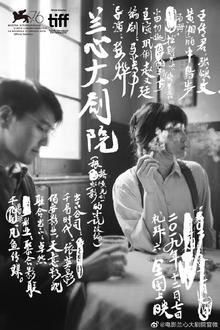We’ve seen interesting work by Lou Ye before and here we have one with Gong Li as the lead. It’s a spy thriller that takes place when Shanghai was an international settlement nominally outside of Japanese control, a setting that I will note is popular for Chinese serials. Naturally Lou Ye adds his own artistic touch and plays around with what the protagonist is really up to. Unfortunately while it sets things up nicely and hints at a complex political situation with multiple factions in play, in the end it all amounts to nothing. All of the prior artistry feels almost superfluous when as it all but devolves into a conventional action movie.
After a long absence, celebrated actress Jean Yu returns to Shanghai, ostensibly to perform in a stage play mounted by her friend Tan Na. The play itself is titled Saturday Fiction and seems to be a romance with Tan Na himself also acting opposite Jean Yu. The people of Shanghai however gossip that she is really there to save her ex-husband who has been detained by pro-Japanese sympathizers. As she checks in to the Cathay Hotel where she is usually stays, she is welcomed by its manager Saul Speyer. In the street, she is also met by a younger woman Bai Yunshang who purports to be a great fan and has tried to audition for a role in the play but may also be an agent of one of the Chinese factions. Meanwhile a Japanese Naval Intelligence officer Furuya also happens to be staying in the hotel at the same time for the purpose of updating the cryptographic codes of the local forces present. It just so happens that his deceased wife resembles Jean Yu. It soon emerges that she is a spy working for the Allies and Furuya is her true target.
So this is the type of spy thriller in which there are additional hidden layers underneath each layer and everyone seemingly has their own agenda. That there may be two competing Chinese governments in play and that the producer of the play and Tan Na’s friend is a leading member of a pro-Japanese group only adds to the intrigue. For artistic effect, Lou Ye even transposes scenes between the stage drama and off-stage events, confusing the audience between the characters in the drama and their real selves. The obvious questions are just who is Jean Yu really and who does she actually love? So it’s really disappointing that the denouement is so simplistic, flattening the conflict into the traditional Allies vs. Japanese struggle and transforming Jean Yu into a female James Bond. The film could have gone so many other different ways, such as humanizing Furuya for example. His wife was accidently killed in an operation by the Allies, possibly by Jean Yu herself. Or developing the character of Tan Na who comes across as nothing more than a hapless chump here who knows next to nothing about what is really going on. But no, towards the end all of the sophistication and layers of subtlety fall away because the fight against the Japanese must be in stark black and white terms.
This was loosely adapted from at least two different books but I don’t believe that it has any particular basis in reality. It is telling that the film never mentions which intelligence agency Jean Yu and her handlers actually work for. The fact that the entirety of the Cathay Hotel seems to be an Allied intelligence outpost is cool but too fanciful. It just isn’t a very believable plot. What I did like is that it portrays the surrealism of this tiny island of Western civilization in the middle of Japanese-controlled territory. A couple of brief shots show that this tiny slice of the Western lifestyle is maintained only through the labor of Chinese maids, laundrywomen and other servants who work diligently in the background. I keep thinking that they must actually live outside of the French concession and so must cross the notional border everyday to get to work. Similarly there are plenty of prosperous Chinese within the territory whose lives appear to go on as usual. The sentiment is aptly expressed by the comments of the two random Japanese soldiers at the end who wonder why all these foreigners are still hanging around there.
This moment in the history of Shanghai is like a bubble that everyone knows will pop soon but everyone is still partying for as long as it lasts. It’s a feeling that is very similar to the Belle Époque of Europe so it’s no wonder that it’s ripe material for fiction of all kinds. This film captures those vibes beautifully. But of the main plot and the characters who play their roles in it, I couldn’t care less about.
